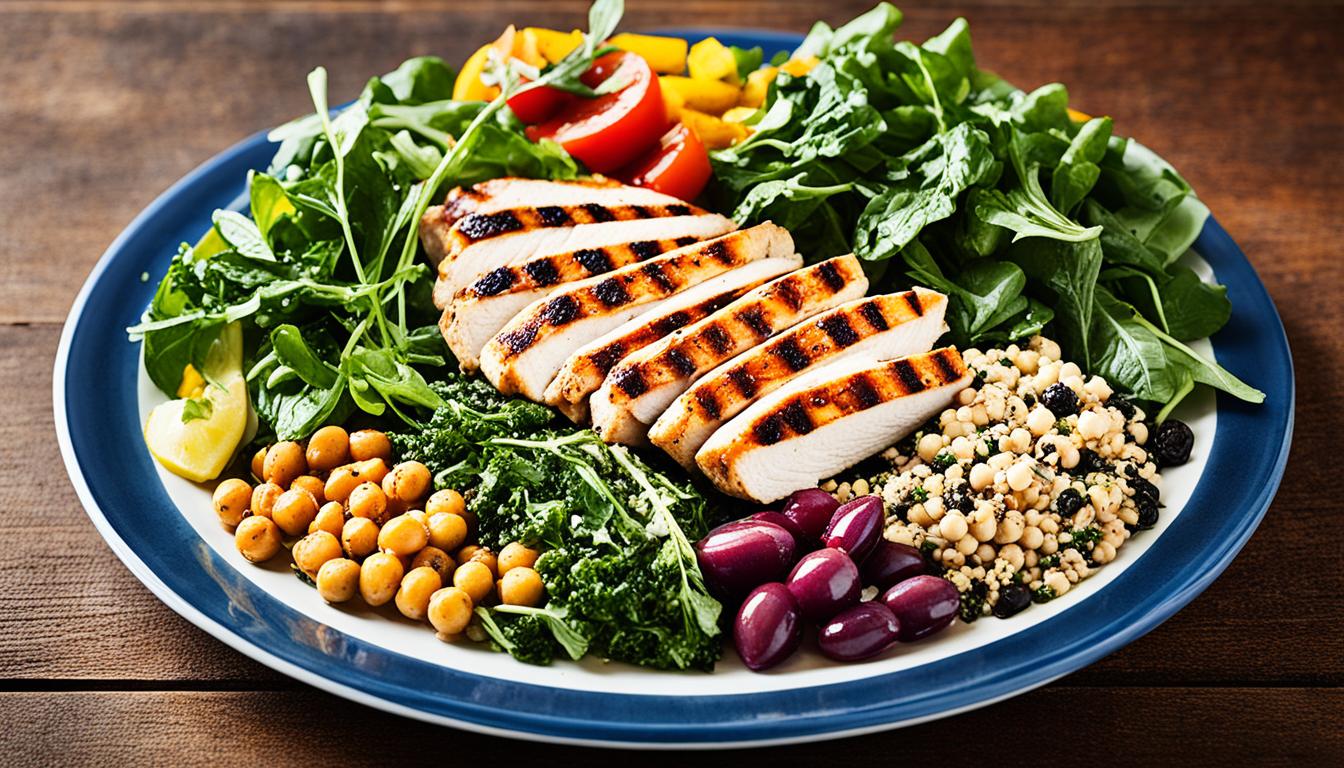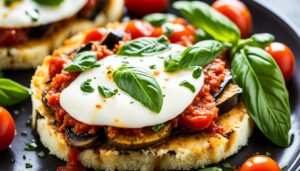Picture starting every day full of energy. You’re ready for anything with the spirit to follow your dreams. You feel strong, and know you’re looking after your well-being. This is what a high protein Mediterranean diet offers.
The Mediterranean diet has long been praised for boosting health and extending life. Adding high protein foods makes it even better. Studies show it helps in losing weight and fighting off diseases like heart disease and diabetes. This powerful mix could change your life.
Our guide dives into why protein is key in a Mediterranean diet. We will look at the variety of protein-rich foods. There’s a sample meal plan too. And, we’ll share how this diet can improve your health. Get set for a journey that feeds your body and soul, improving your health all the way.
Key Takeaways:
- A high protein Mediterranean diet promotes weight loss, protects against chronic conditions, and supports overall wellbeing.
- Incorporating protein-rich foods into the Mediterranean diet enhances its positive effects.
- The Mediterranean diet emphasizes protein sources such as fish, legumes, nuts, seeds, and lean poultry.
- Planning and preparing high protein Mediterranean meals in advance is key to success.
- A high protein Mediterranean diet offers a variety of health benefits, including weight management and muscle support.
The Importance of Protein in a Mediterranean Diet
Protein is key in a high protein Mediterranean diet for health and wellbeing. It is important to eat protein-rich foods in this diet for better nutrition and a healthy life.
Promotes Muscle Development and Maintenance
Protein is essential for keeping muscles strong and healthy. In a high protein Mediterranean diet, it ensures enough protein for muscle growth and repair. Foods high in protein provide amino acids, which build and maintain lean muscle, boost physical performance, and increase metabolism.
Aids in Satiety and Weight Management
Eating protein helps you feel full and satisfied. Including it in a Mediterranean diet helps prevent overeating and supports weight management. Protein-rich foods take longer to digest. This helps control hunger and reduces the urge for unhealthy snacks. Feeling fuller can help keep a healthy weight and avoid health issues related to weight.
Supports Various Bodily Functions
Protein is crucial for many bodily functions like making enzymes, hormones, and antibodies. It helps keep tissues and organs healthy. Enough protein is needed for cells to work well, move nutrients, and support the immune system. Eating foods rich in protein as part of a Mediterranean diet provides the building blocks for these important functions.
Protein is vital in a high protein Mediterranean diet. It boosts muscle growth, helps control hunger, and supports body functions. Eating foods like fish, legumes, nuts, seeds, and lean poultry enriches the diet. This makes it healthy, tasty, and fulfilling.
| Protein-Rich Foods in a Mediterranean Diet | Protein Content per 100g |
|---|---|
| Salmon | 22g |
| Lentils | 9g |
| Almonds | 21g |
| Chicken Breast | 31g |
| Feta Cheese | 14g |
Protein Sources in the Mediterranean Diet
The Mediterranean diet is packed with different protein sources. These proteins are key for a high protein meal plan. Including them in your meals gives you needed protein and makes your diet balanced and fulfilling.
Fish
Fish is a top protein pick in the Mediterranean diet. Options like salmon and sardines are protein-rich and have lots of omega-3s. These fats are great for your heart and can lower inflammation.
Legumes
Legumes, such as lentils and beans, are great for protein too. They also bring plenty of fiber to the table, which helps with digestion and keeps you full. You can add legumes to salads or soups for extra protein.
Nuts and Seeds
Nuts and seeds like almonds and chia are full of protein, fats, and vitamins. They’re easy snacks or can enhance salads, yogurt, or smoothies.
Lean Poultry
Lean poultry, including chicken and turkey, fits well into Mediterranean dishes. It’s a healthier option than red meat and has essential amino acids for muscle repairs.
Adding these protein sources to your Mediterranean meal plan brings tasty variety and great nutrition benefits.
| Protein Sources | Benefits |
|---|---|
| Fish | High in omega-3 fatty acids for heart health |
| Legumes | Rich in fiber, aiding digestion and promoting satiety |
| Nuts and Seeds | Provide healthy fats and essential nutrients |
| Lean Poultry | Good source of lean protein for muscle growth and repair |
High Protein Mediterranean Meal Plan
Planning meals ahead helps stick to a high protein Mediterranean diet. This meal plan includes high protein recipes. It makes it easy to get daily protein and enjoy tasty, nutritious food.
Sample Seven-Day Meal Plan
Here’s a sample seven-day meal plan for a high protein Mediterranean diet:
| Day | Breakfast | Lunch | Dinner | Snacks |
|---|---|---|---|---|
| Monday | Greek yogurt with mixed berries and almonds | Mediterranean lentil salad with grilled chicken | Baked salmon with roasted vegetables | Hummus with carrot sticks |
| Tuesday | Spinach and feta omelet with whole wheat toast | Quinoa salad with chickpeas and grilled vegetables | Grilled shrimp skewers with quinoa pilaf | Handful of almonds |
| Wednesday | Oatmeal with sliced banana and walnuts | Greek salad with grilled chicken | Eggplant Parmesan with whole wheat pasta | Yogurt with fresh fruit |
| Thursday | Smoked salmon and avocado toast | Roasted vegetable wrap with hummus | Chicken souvlaki with Greek salad | Trail mix with dried fruit and nuts |
| Friday | Whole wheat pancakes with blueberries and Greek yogurt | Grilled vegetable and feta quinoa bowl | Lemon herb grilled chicken with couscous | Hard-boiled eggs |
| Saturday | Vegetable and cheese frittata | Lentil soup with whole grain bread | Grilled lamb chops with roasted potatoes | Olives and cheese |
| Sunday | Smoothie with Greek yogurt, spinach, and berries | Caprese salad with mozzarella and balsamic glaze | Stuffed peppers with ground turkey and quinoa | Fruit salad |
This meal plan offers a variety of flavors. It’s filled with proteins and nutrients needed for the body.
Benefits of a High Protein Mediterranean Diet
A high protein Mediterranean diet offers numerous health benefits. Including protein-rich foods leads to positive effects.
1. Weight Management
This diet helps with weight control. Protein makes you feel full longer, reducing the desire for unhealthy snacks. Eating protein-rich foods curbs hunger and helps avoid overeating, promoting healthier weight management.
2. Muscle Growth and Repair
It also supports muscle growth and repair. Protein is vital for keeping muscles strong, especially as you age. Foods like fish, legumes, and lean poultry provide the protein needed to maintain muscle strength and vitality.
3. Reduced Risk of Chronic Conditions
The diet lowers the risk of diseases like heart disease, diabetes, and some cancers. Foods such as fish, nuts, and legumes offer key nutrients and antioxidants. Following this diet helps safeguard against these chronic conditions.
4. Overall Wellbeing
It improves overall wellbeing. The diet’s variety of nutrient-rich foods supports body functions and health.
Choosing a high protein Mediterranean diet boosts both protein intake and wellbeing. It’s great for managing weight, supporting muscles, lowering disease risk, and enhancing overall health.
Healthy High-Protein Mediterranean Recipes
Making meals with protein-packed foods from the Mediterranean can be both tasty and healthy. The Mediterranean diet focuses on fresh, tasty ingredients. Adding proteins to these dishes makes meals that are both filling and balanced.
Here are some examples of high protein Mediterranean recipes:
- Grilled Chicken with Lemon and Herbs: Enjoy grilled chicken marinated in lemon, herbs, and spices. Pair it with a Greek salad for a meal rich in protein.
- Lentil Salad with Roasted Vegetables and Feta Cheese: Lentils, roasted veggies, and feta cheese make up this salad. A lemon-herb dressing adds the perfect touch for a fulfilling lunch.
- Baked Salmon with a Mediterranean Salsa: This recipe highlights fresh seafood with a salmon fillet topped with a tomato, olives, capers, and herb salsa. Serve with quinoa or roasted veggies for dinner rich in protein.
These high protein Mediterranean recipes let you enjoy the diet’s tasty dishes while getting important nutrients. Dive into the Mediterranean flavors and benefit from a diet rich in proteins!
Benefits of High Protein Mediterranean Recipes
“Incorporating protein-rich foods into Mediterranean recipes can provide a wide range of health benefits. By combining lean meats, legumes, and fish with the flavors of the Mediterranean, individuals can enjoy delicious meals while supporting their overall health and wellbeing.”
Eating high protein Mediterranean meals has several advantages. Including proteins can help you stay full longer, aiding in weight control and reducing the chance of overeating.
Also, a protein-rich diet supports the growth and repair of muscles. Mediterranean dishes offer a mix of proteins like meats, legumes, and fish. These are vital for building muscles.
Enjoying high protein foods with Mediterranean flavors means you get a balanced diet. These dishes combine different protein sources for a nutritious meal plan.
Eating these recipes allows you to enjoy delicious Mediterranean flavors while getting the nutrients your body needs.
| Recipe | Description |
|---|---|
| Grilled Chicken with Lemon and Herbs | Tender grilled chicken marinated in a zesty blend of lemon juice, herbs, and spices. Served with a refreshing Greek salad. |
| Lentil Salad with Roasted Vegetables and Feta Cheese | A colorful salad featuring protein-packed lentils, roasted vegetables, and tangy feta cheese. Finished with a light lemon-herb dressing. |
| Baked Salmon with a Mediterranean Salsa | A succulent salmon fillet seasoned with herbs and spices, topped with a vibrant salsa made from tomatoes, olives, capers, and fresh herbs. Served with quinoa or roasted vegetables. |
Try These Protein-Rich Mediterranean Recipes Today
If you want to eat more protein or follow a Mediterranean diet, these recipes are a great choice. They offer a tasty and healthy way to enjoy the Mediterranean’s signature flavors and ingredients.
Experience the vibrant tastes of the Mediterranean and the joy of a meal full of protein.
Tips for Following a High Protein Mediterranean Diet
To make following a high protein Mediterranean diet easier, here are some tips. Aim to include a protein source with every meal and snack. This means you could add Greek yogurt to your breakfast or enjoy legumes in salads. Even a piece of grilled fish for dinner works great.
Planning meals in advance helps ensure you eat a balanced diet. Meal prepping and keeping protein-rich snacks on hand are key. This way, you’re less likely to choose unhealthy foods.
Meal prepping and having protein-rich snacks readily available can prevent unhealthy food choices and support adherence to the high protein Mediterranean diet.
Keeping up with a high protein Mediterranean diet can be both easy and fun. Include protein in every meal and snack, and plan ahead. You’ll meet your daily protein needs and enjoy tasty Mediterranean flavors.
Implementing Protein Sources in Every Meal
For a high protein Mediterranean diet, include protein in every meal. Start the day with Greek yogurt, fresh berries, and almonds for a nutritious breakfast.
Lunch can be a salad with chickpeas or lentils, vegetables, and olive oil. It’s both refreshing and protein-packed.
Dinner is a great time for more protein. Try grilled fish, like salmon, with roasted vegetables and quinoa. It’s a delicious end to the day.
Benefits of Meal Prepping
Meal prepping helps you stick to your high protein Mediterranean diet. It saves time and prevents unhealthy eating. Prepare protein-rich meals in advance for the whole week.
When meal prepping, use a variety of protein sources. Roast chicken or cook lentils to mix into different dishes. Add vegetables, grains, and healthy fats for complete meals.
Keep protein snacks like nuts, hard-boiled eggs, or Greek yogurt ready. They help avoid less healthy choices when you’re hungry.
Maintaining a Balanced Diet
Protein is vital, but other foods are too for a balanced diet. Eat fruits, veggies, grains, and healthy fats with your protein. This approach ensures good nutrition.
Staying hydrated is crucial. Drink at least 8 glasses of water a day for health and digestion.
Add exercise to your routine for extra health benefits. Regular physical activity, like strength training or cardio, supports muscle growth and wellness.
These tips can help you enjoy a high protein Mediterranean diet. It’s good for your health and lets you enjoy delicious Mediterranean meals.
High Protein Foods to Incorporate Into a Mediterranean Diet
The Mediterranean diet has many high protein foods to try. Including these foods helps make a diverse and healthy eating plan. It’s a great way to support your health and happiness.
Legumes
Chickpeas and lentils are top protein sources in this diet. They’re great in salads, soups, and even as vegetarian patties.
Fish
Fish like salmon and tuna are full of protein and omega-3 fats. These fats are good for your heart and add to the diet’s benefits.
Poultry
Chicken and turkey offer lean protein. They fit well in Mediterranean meals, especially when grilled or baked. They taste great with many vegetables.
Eggs
Eggs can be used in many ways in a Mediterranean diet. Enjoy them in breakfast dishes, salads, or in healthy baking.
Yogurt
Yogurt, especially Greek yogurt, is rich in protein and probiotics. These probiotics are good for your gut health. It’s a strong part of the diet.
Nuts and Seeds
Nuts and seeds like almonds, walnuts, and chia are packed with protein, healthy fats, and nutrients. They’re perfect on salads, yogurt, or as a snack.
Adding these high protein foods to a Mediterranean diet makes eating well-rounded and satisfying. It’s excellent for overall health and wellbeing.
Maintaining a High Protein Mediterranean Diet
To keep up a high protein Mediterranean diet, remember it’s for your long-term health. Start by setting up a meal plan. This includes a variety of protein-rich foods in your daily meals and snacks. Here are a few tips to help:
- Create a Meal Plan: Planning your meals ahead helps balance protein sources. It ensures variety through the week. This keeps you on track and away from unhealthy choices.
- Include Protein in Every Meal: Add a protein source like fish, legumes, or lean poultry to each meal. It meets your daily protein needs and keeps you full.
- Listen to Your Body: Notice when you’re hungry and when you’re full to avoid overeating. Eat until you’re satisfied, not full.
- Engage in Regular Physical Activity: Exercise supports muscle growth and health. Mix strength training with cardio for the best results.
By choosing these lifestyle changes and watching your protein, you can stick to a high protein Mediterranean diet. This diet continues to offer health benefits.
Recommended Protein Sources for a High Protein Mediterranean Diet:
| Protein Sources | Examples |
|---|---|
| Fish | Salmon, sardines, tuna |
| Legumes | Chickpeas, lentils, beans |
| Poultry | Chicken, turkey |
| Eggs | Hard-boiled, scrambled |
| Yogurt | Greek yogurt |
| Nuts and Seeds | Almonds, chia seeds |
Add these protein sources to your meals. They make your high protein Mediterranean diet balanced and enjoyable.
Conclusion
A high protein Mediterranean diet boosts your health in many ways. It helps in managing your weight and supports muscle repair. Also, it lowers the risk of long-term illnesses. This diet focuses on whole foods like fruits and veggies. It includes lean proteins and good fats too.
Adopting this diet takes your health to higher levels. It lets you enjoy the rich tastes of Mediterranean food. This diet is full of nutrient-rich foods. You’ll get to try various protein sources like fish, beans, chicken, eggs, yogurt, nuts, and seeds. Eating these foods gives your body the nutrients it needs to stay healthy.
Don’t wait to start a high protein Mediterranean diet. Find yummy recipes and plan your meals to enjoy its benefits. If you stick with it, you’ll reach your health goals. Plus, you’ll love the delicious flavors of Mediterranean cuisine.





